Ingredients
 | A cardboard Box significantly bigger than your head. |
 | A hole |
 | A curtain or other light proof fabric |
Instructions
Make a hole in the middle of one side of the box, start off about 3-4mm across
Stick a piece of paper on the opposite side inside the box
Point the hole at a bright window
Put your head in the entrance of the box so you can see the paper without getting in the way of the hole.
Get someone to cover the gap between you and the box with the curtain, being carful not to cover up the hole.
What do you see?
If you make the hole bigger, what happens?
Result
You should see a dim, upside down image of the window you are pointing the hole at.
If you make the hole bigger it should make the image brighter but less sharp.
 |  | 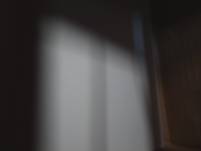 |
| A 4mm hole | A 10mm hole | A 25mm hole |
Explanation
It is easiest to start thinking about shadows. If you put something in the way of a light it will cast a shadow.
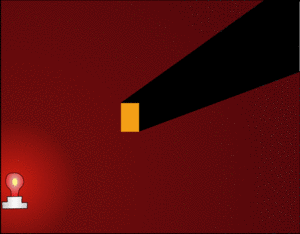
If you put something in the way of 2 lights it will cast 2 shadows, one from each light. This is why when you walk along a streetlight road you can have multiple shadows. If the lights are different colours, you can get funky effects of coloured shadows.
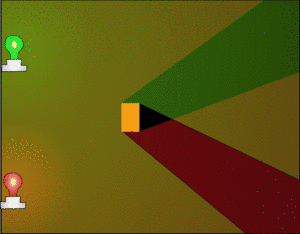
Now Instead of thinking about a small object getting in the way of a light, think about a hole which lets light through into a box. It will cast an anti-shadow of light. The antishadows will be the same colour as the lights and produce bright spots on the back of the box.
| 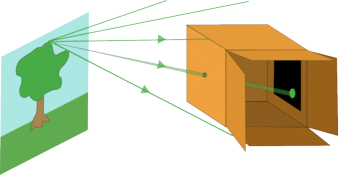 |
| Light coming from one part of an object will be projected into one place on the screen forming a spot. |
If you have more lights you will get more spots on the back of the box, and the position of the spots will relate to where the lights are outside, but because the light travels in a straight line the image on the back of the box will be upside down.
|  |
| All the different parts of the object form spots in different places creating an image like a Pontilist painting |
Because everything in a scene is either emmiting or reflecting light you can thing of the scene as being made up of lots of different coloured lights, so each part of the scene will make a spot on the back of the box, building up an upside down image of what you can see outside, just using a hole. In the 16th century this type of machine was used in Italy to help artists paint scenes, and is known as the Latin for a 'dark room' - Camera Obscura. It is the basis of how your eyes and all cameras work.
Why does it go fuzzy when you make the hole bigger?
If you make the hole bigger more light can get in so the image is brighter, however the size of each antishadow gets bigger so they all tend to overlap making the image fuzzy.
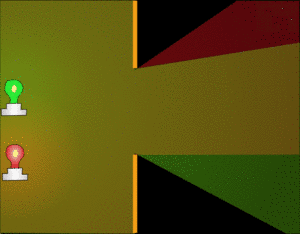
With this large hole instead of getting 2 seperate spots you would get two horribly overlapping splurges.
- Previous Making a Mess with Milk
- Next Images from a Magnifying Glass
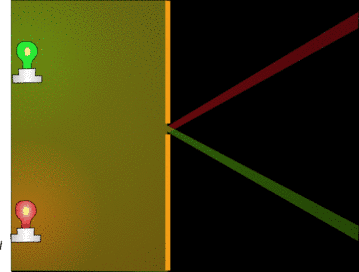
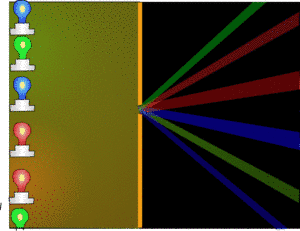










Comments
yes and dis equipment is easy
yes and dis equipment is easy to make just attempt it
Add a comment